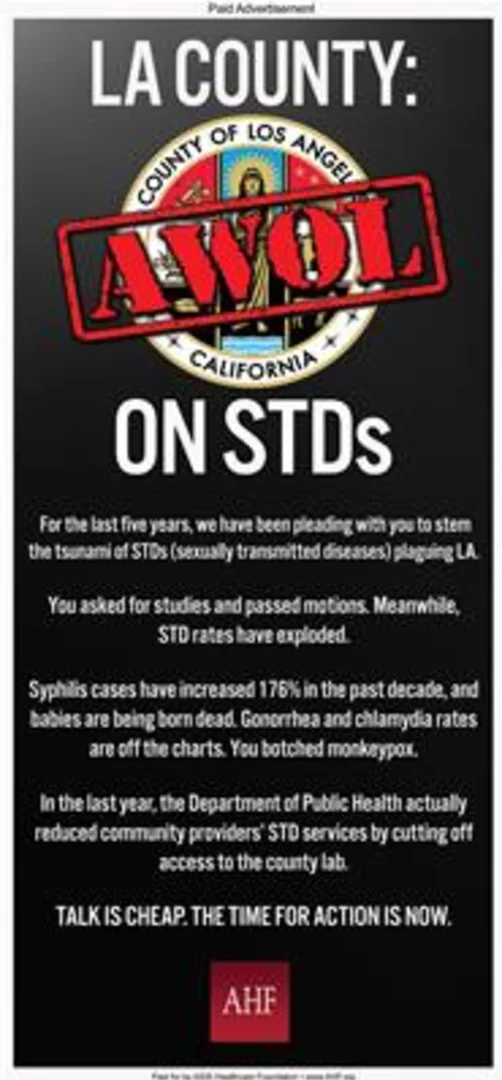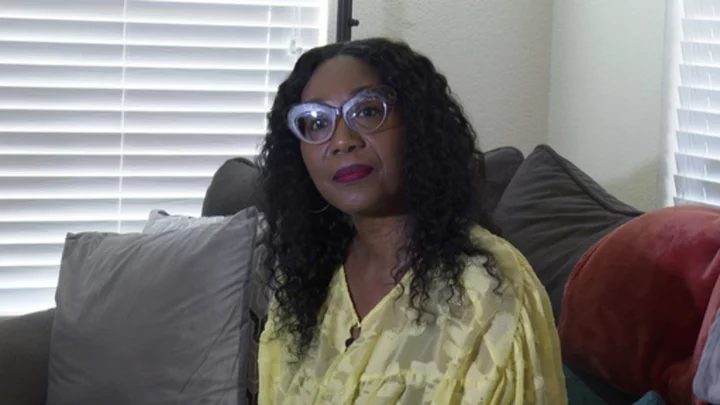"This is for all my listeners with a vagina. Ever feel not quite right down there?"
In season two of And Just Like That, Carrie Bradshaw (Sarah Jessica Parker) can’t make it to the end of the scripted podcast ad about vaginal wellness products. She tells her producer that she’s not comfortable reading the ad for vaginal odour suppositories – promo code "Vag In The City" – but not for the reason you might think.
Carrie is uncomfortable talking about her vagina on her podcast. Whether or not you think it’s out of character for Carrie – who is famously a sex and relationship writer – to not want to talk about her vagina, you have to respect her right to set that boundary. Even if her podcast is called Sex and the City, it’s still alarming how no one at the podcast network seems to listen to her ‘no’.
It’s hardly unrealistic that Carrie feels shame about her vagina – a 2022 study from the Department of Health and Social Care found that 42 percent of women and people with a cervix said that embarrassment was the reason they wouldn’t book a cervical screening appointment. Justin Hancock, a relationships and sexuality educator who runs BISH (one of the world's leading online sex ed resources for young people), attributes this to insufficient relationships and sex education (RSE). Hancock says RSE "has a tendency to avoid the body, particularly actually existing bodies and the wide range of how bodies function, look, and smell. [When] the body is covered, it’s usually only in terms of reproductive health or sexual health such as STIs – where there is something ‘wrong’ with the body."
SEE ALSO: What do intimate washes do to our vaginas?The shame and stigma that RSE leaves us with, combined with the misogynistic mainstream messages of disgust about the bodies of women and other people of marginalised genders, means vaginal shame is a tale as old as sexism. But by focusing on whether or not Carrie should be comfortable talking about vaginas on her podcast, And Just Like That misses an opportunity to discuss a more pressing issue: Carrie should have refused to read the ad because we don’t need products to change how our vaginas smell.
Carrie should have refused to read the ad because we don’t need products to change how our vaginas smell.Vaginas don’t smell like freshly baked cookies
All vaginas smell. Hancock explains that they all "have their own distinctive smell [which] can vary in strength over time, throughout the menstrual cycle, and from person to person." The smell comes from vaginal discharge and is completely normal.
Yet many of us have internalised the idea that we need to worry about how our vagina smells. Dr. Liz Powell, a sex educator and licensed psychologist, challenges people to question why we think our vaginas might smell bad. "Vaginas smell like vaginas. Your butthole is not going to smell like a bouquet of roses. Your vagina shouldn't smell like a spring meadow. That's just not how bodies are."
"Vaginas smell like vaginas. Your butthole is not going to smell like a bouquet of roses. Your vagina shouldn't smell like a spring meadow. That's just not how bodies are."The idea that our vaginas should smell like spring meadows is one of the reasons why the sexual wellness industry is valued at around $58.5 billion in 2023. Sexual empowerment is ‘in’ right now, and it’s profitable! Buy our vaginal suppositories so you don’t have to worry about how you smell when your partner goes down on you, companies say. All the feminist, sex-positive marketing is designed to make us forget that the product itself reinforces the idea that you should be ashamed of your vagina’s natural smell.
SEE ALSO: Has sex tech capitalism hijacked sexual liberation?While you need to wash your vulva, your vagina is a self-cleaning system. Hancock explains that "if we upset the pH level of the vagina with too much washing, this can actually interfere with the vagina’s ability to clean itself, which may lead to a condition which makes the vagina smell more strongly." (There is one exception to this. In Vagina Museum founder Florence Schetcher’s book, V: An Empowering Celebration Of The Vulva And Vagina, she points out that people who’ve had vaginoplasty do need to clean their vaginas.)
Want more sex and dating stories in your inbox? Sign up for Mashable's new weekly After Dark newsletter.
Noticing a change in how your vagina smells might be an indication that you have an STI, bacterial vaginosis, or a yeast infection. The correct thing to do is to speak to your GP or a sexual health service. Products promising to change how your vagina smells are worse than unnecessary in this situation. Powell says that they might actually make things worse: "Anything that is designed just to address odour, unless it is addressing the underlying causes of odour, [is just] going to camouflage it with fragrances, which is actually really bad for your delicate mucosal membranes."
SEE ALSO: How the internet gave me a vaginal tightness complexWhile Powell hasn’t heard of vaginal suppositories to deal with vaginal odour, they wouldn’t be surprised if they exist. They’re simply a rebrand of the vaginal douche – perhaps because people are starting to become aware that you don’t need to wash your vagina. However, vaginal suppositories – or, to give them the correct term, vaginal pessaries – that are helpful do exist. They can be used to induce labour or to treat yeast infections like thrush.
Vaginal suppositories for lubrication can also help if you have vaginal dryness from going through menopause or because you’re on testosterone. Why couldn’t we have seen Carrie read an ad for vaginal suppositories designed for lubrication rather than vaginal odour? Or, better yet, an ad for an organic lube? That feels far more on-brand for her and could have tackled the idea that needing lube is shameful.
SEE ALSO: What causes vaginal dryness?Capitalism tells us our vaginas are 'broken' so it can sell us a 'fix'
Companies take advantage of our insecurities to sell us products that we don't need. Hancock points out that this is exactly how capitalism works: "Where companies deliberately create the sense of ‘lack’ in us, that something is missing, that other people have better sex and relationships than us, or that other people have beautiful smelling vaginas, they are telling us that we are not good enough."
For all these companies' talk about sexual empowerment, their message is that we need to be "fixed," rather than putting pressure on a sex-negative culture to stop telling us that our bodies are "broken". With all of our fears about sex and our bodies – whether we’re doing it right, whether we’re attractive enough – Powell points out that it’s important to question what kind of empowerment companies are offering you: "Are they offering you freedom from other people's expectations, or are they offering you a way to meet expectations that you haven't actually figured out whether you agree with them?"
That’s not to say everyone in the sexual wellness space is trying to exploit you. Hancock points out that not all sexual wellness products are bad or that they might not help us. "We should also not feel shame about buying things which might change our bodies or change our relationship to them. It’s okay to buy something if we think that it [can] help us to feel sexier, more in our bodies."
The language of sex positivity can sometimes make people feel shame for not being "up for it". In Carrie’s case, "it" is reading an ad for vaginal wellness products.Carrie is called a diva because she doesn’t want to read the ad. An important critique of sex positivity is that in encouraging people not to feel shame for their sexual desires, the message can sometimes get twisted. Sex positivity should be about people being able to have the sex they want, but the language of sex positivity can sometimes make people feel shame for not being "up for it". In Carrie’s case, "it" is reading an ad for vaginal wellness products.
At the end of the episode, Carrie is shamed by one of the podcast network staff, who blames Carrie’s decision not to read the ad for the network folding. (Blaming a woman’s boundaries for a small media business closing its doors in 2023? That might be the most realistic portrayal of media in the whole of the SATC universe.)
It would have been empowering, albeit out of character, to see Carrie push back against being asked to read an ad for unnecessary sexual wellness products. It would have been radical if her objections had been less about her discomfort with talking about her own body and more about how she doesn’t want to perpetuate the idea that vaginal odour is something that people should be ashamed of.
Because if we aren’t ashamed of our bodies, or uncomfortable with the type or amount of sex we’re having, how can we be sold a product that promises to fix us? You can’t make money selling suppositories designed to hide vaginal odours if people aren’t worried that their vaginas smell. You can’t make a profit from your product promising to detox and rejuvenate people’s vaginas if they know they don’t need to wash them. In the end, capitalism is incompatible with sexual liberation.
And Just Like That is a light-hearted comedy-drama: it’s not supposed to be offering us the RSE we should have received when we were younger. But in the absence of that education, we all know people end up looking to shows like And Just Like That (and Sex and the City before it) for answers about whether we’re normal, whether we’re broken, whether we’re "good enough". And Carrie let us down by not explicitly saying that we don’t need to worry about how our vaginas smell.









